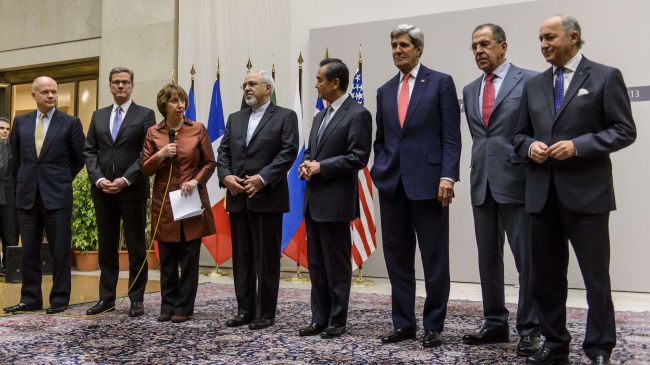
Chairman of the Russian State Duma’s International Affairs Committee Alexei Pushkov says Israel’s position on the nuclear deal between Iran and six major world powers is unrealistic and displays Tel Aviv’s own security concerns.
“No other compromise would have been possible in my opinion. Israel’s position reflects its security concerns, but does not look realistic,” Pushkov told Interfax on Sunday.
“I think, Israel is in fact being guided by a maximalistic position, which boils down to the belief that Iran must be denied everything, even the right to create a nuclear energy industry of its own. I don’t think Iran can be denied this right,” the senior Russian lawmaker added.
He noted that all the countries that had been involved in drafting the Geneva agreement share the opinion that Iran cannot be denied of the right to develop peaceful nuclear energy program.
After more than four days of intense negotiations, Iran and the five permanent members of the UN Security Council — the US, Britain, Russia, France and China — plus Germany, sealed an interim deal in Geneva on Sunday morning to pave the way for the full resolution of the West’s decade-old dispute with Iran over its nuclear energy program.
Earlier on Sunday, Russian President Vladimir Putin called the historic deal between Iran and the six powers on Tehran’s nuclear energy program as a “breakthrough,” cautioning that it is only the first step on a long path.
“A breakthrough step has been made, but only the first on a long and difficult path,” Putin said.
Meanwhile, Russian Foreign Minister Sergei Lavrov praised the Geneva deal and called it a “win-win situation for all parties.”
“Nobody lost, everyone ends up winning,” Lavrov said.
According to the Iranian Foreign Ministry, the deal allows Iran to continue its activities at Arak, Fordow and Natanz facilities. The agreement also stipulates that no additional sanctions will be imposed on Tehran because of its nuclear energy program.
Addressing journalists on Sunday after the announcement of the deal, Iran Foreign Minister Mohammad Javad Zarif said Iran’s right to enrichment has been recognized in the deal.
The top Iranian diplomat noted that the interim deal is an “important achievement” but a “first step” toward resolving an “unnecessary crisis,” stressing that the two sides need to work together based on “equal footing, mutual respect and common benefits” to settle the dispute over Tehran’s nuclear energy program.







